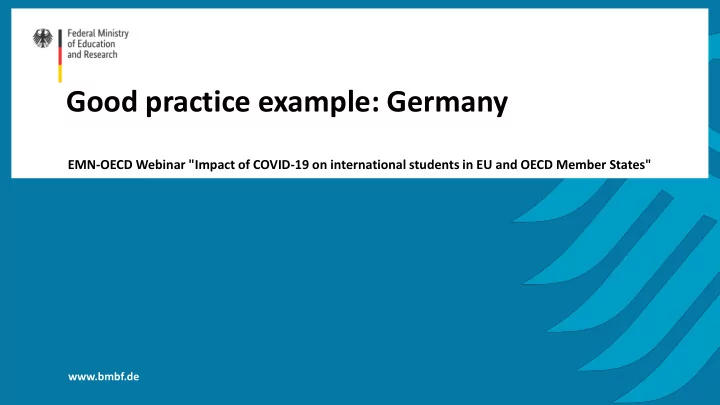

Good practice example: Germany EMN-OECD Webinar "Impact of COVID-19 on international students in EU and OECD Member States" www.bmbf.de
International students in Germany before the Covid-19 pandemic More than 300,000 international students with a foreign higher education entrance qualification (Bildungsauslaender) enrolled in a first- or second-cycle study programme at a German higher education institution. As destination for international students, Germany ranked no. 4 globally. http://www.wissenschaftweltoffen.de Bernd Fischer (BMBF) 17.09.2020 2
International students in Germany since the Covid-19 pandemic • When borders were closed in March, many international students were on vacation in their home countries. Re-entry into Germany not possible due to global travel bans. • Other international students left Germany voluntarily. • No enforcement to leave the country. • Most of the lectures during the summer semester (April to July) offered online only. Altogether, around 80,000 international students have stayed abroad in the pandemic. Bernd Fischer (BMBF) 17.09.2020 3
Financial situation of international students • No tuition fees for international students at most of the German higher education institutions. • Scholarship programmes for international students, e.g. by the German Academic Exchange Service (DAAD). • Half of international students work while studying. • Many lost their jobs due to the Covid-19 pandemic, but situation gradually improving as universities, restaurants and other businesses are reopening. Bernd Fischer (BMBF) 17.09.2020 4
Financial measures of the German Federal Government • German scholarship providers have generously and flexibly revised their conditions with the consent of the Federal Government. The same applies to the Erasmus+ programme. • Federal Ministry of Education and Research (BMBF): financial aid package to students faced with pandemic-related financial hardship: 1. the KfW student loan, 2. interim aid grants of the student services organisations https://www.bmbf.de/en/interim-financial-aid-for-students-what-you-need-to-know-12062.html • additional support programmes of several Länder . Bernd Fischer (BMBF) 17.09.2020 5
1. KfW student loan • a well-established low-interest loan to cover living expenses of students in Germany. Provided by the KfW banking group, Germany’s publicly -funded promotional bank • offered interest-free from May 2020 to March 2021. Accrued interest covered by BMBF. From April 2021, loan recipients to resume payment at the usual annual interest rate (4 to 4.5%) • up to €650 per month (online application) • accessible for international students from July 2020 until March 2021 • demand by international students disproportionately high (more than 50% of applications) • https://www.kfw.de/inlandsfoerderung/Private-customers/Education-and-Training/KfW-Studienkredit/KfW-Corona-Hilfe-f%C3%BCr-Studierende/ Bernd Fischer (BMBF) 17.09.2020 6
2. Interim financial aid grant for students • grants allocated by the 57 local student services organisations • u p to €500 for each of the months of June, July, August and September 2020 • open to students faced with pandemic-related hardship irrespective of nationality – more than 30% of the applicants have a foreign nationality • applicants must be enrolled at a public or state-recognised HEI in Germany and not on leave of absence from their studies at the time of application • students apply monthly and online, local student services organisations decide within the available means (overall budget of €100 million) • https://www.überbrückungshilfe-studierende.de/start Bernd Fischer (BMBF) 17.09.2020 7
Outlook on the upcoming 2020/21 winter semester • hybrid semester at most universities starting on 1 November • extended grace periods for course completion in some Länder • but personal circumstances and anxieties as well as available transport links play an important role, too • applicants from abroad expected to amount to roughly 80% of last year Bernd Fischer (BMBF) 17.09.2020 8
2019 Country of origin Number in % 39,871 13.2 China 20,562 6.8 India 13,032 4.3 Syria How may international students in 11,495 3.8 Austria 10,439 3.5 Russia Germany be affected by entry restrictions? 9,246 3.1 Italy 8,534 2.8 Iran • EU Council recommendation of 30 June: entry of students 8,470 2.8 Turkey allowed from all countries (China: subject to reciprocity) 7,211 2.4 Cameroon • German Cabinet decision of 1 July: re-entry of students holding 7,047 2.3 France a valid student residence permit allowed. New visas required a Ukraine 6,926 2.3 written confirmation by the university for each individual visa Spain 6,354 2.1 applicant that studies cannot be fully performed from abroad Bulgaria 6,216 2.1 ( update: requirement repealed in September ) USA 6,111 2.0 • delays in visa processing at several German consulates in third South Korea 6,090 2.0 countries Tunisia 6,042 2.0 Pakistan 5,753 1.9 Legend: Morocco 5,555 1.8 • Green: EU or whitelisted third countries Vietnam 5,402 1.8 • Black: Third countries • 5,158 1.7 Indonesia Red: Third countries subject to reciprocity (for Germany: China, Japan, South Korea) 302,157 100.0 Total Bernd Fischer (BMBF) 17.09.2020 9
Conclusions • Germany has gone through the pandemic well so far: low infection and morbidity rates • German universities have restructured their study programmes as online studies (digitalisation push), but most students prefer a return to real classes • the Erasmus+ programme and German scholarship providers have generously and flexibly revised their conditions for national and international students • BMBF support (loans and grants) for students affected financially by the pandemic • opportunity to avoid a decline of international students at German universities, but dependent on lift of international travel restrictions and processing of visa applications Bernd Fischer (BMBF) 17.09.2020 10
Thank you for your attention! • Bernd Fischer Deputy Head of Division 413 - European Higher Education Area, Internationalization Federal Ministry of Education and Research (BMBF) Kapelle-Ufer 1, 10117 Berlin | Postal Address: 11055 Berlin Bernd.Fischer@bmbf.bund.de www.bmbf.de Bernd Fischer (BMBF) 17.09.2020 11
Recommend
More recommend